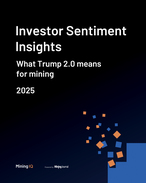This article is 6 years old. Images might not display.
Coronado said it reaffirmed its production, operating cost and capital expenditure guidance for the FY19 period, reflecting ongoing improvements in the operating performance of its assets. But due to the current weakness in benchmark prices for metallurgical coal, Coronado has revised its earnings before interest taxation depreciation and amortisation guidance range downwards to US$687-737 million.
The revised EBITDA guidance range is based on various assumptions, including a spot price of abour $140 per tonne for the remainder of the year.
This is below the spot price of $160 at the time of the half year results announcement on August 5 2019.
The revised guidance also assumes higher than normal inventory levels in the US, for coal being reserved in order to generate higher margins in the event there is a recovery in prices in the short term.
Coronado's exposure to fuel prices is fully hedged, and therefore, the recent spike in oil prices will not affect the earnings guidance.
These revised assumptions result in a reduction of $50 million in EBITDA to the lower end of the original guidance range of $737-807 million.
Coronado CEO Gerry Spindler said: "We can control most things in our business, but we cannot control global market pricing for metallurgical coal.
"The recent fall in spot prices, if sustained, is likely to adversely impact EBITDA. In the short term we see the possibility of prices remaining at lower levels, with the potential for further deterioration in light of the uncertainties and weakness in the global macro-economic environment."
Coronado has achieved significant operating efficiencies at its Curragh mine in Queensland since its acquisition in March 2018 and will continue to benefit from reduced operating costs.
With a competitive and low-cost operating structure, low gearing and suite of highly sought-after, quality metallurgical coal products from the US domestic and global seaborne markets, Coronado remains optimistic for its long-term growth prospects, according to Spindler.
"Given our low-cost operating structure and balance sheet capacity, we are better positioned than most of our peers to weather a softer price environment without the need to reduce critical investment in our assets," he said.
"Our disciplined approach to managing our balance sheet means we can also tolerate lower prices for longer and pursue accretive acquisitions if and when they arise. While the US trade negotiations and the weakness in global macro-economic factors are having material impacts on near term prices, we believe the fundamental factors that support continued growth in demand for high quality metallurgical coal in the long term remains unchanged."


























